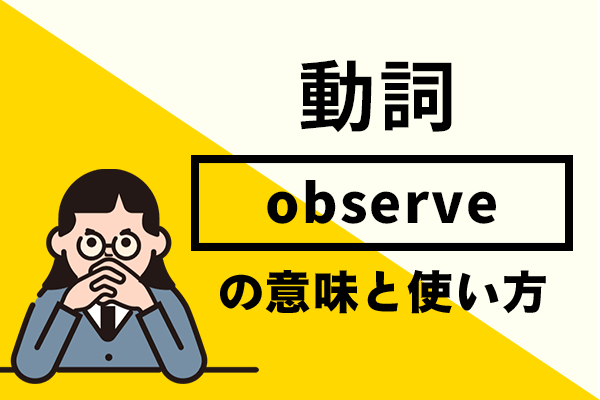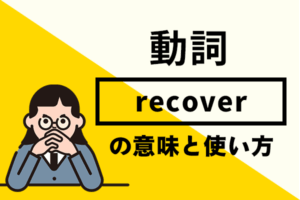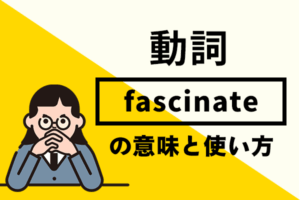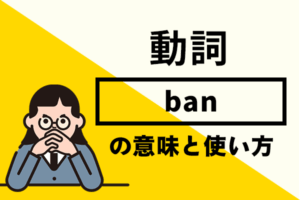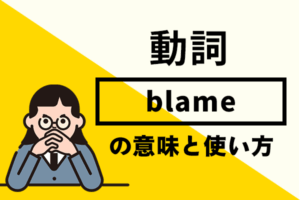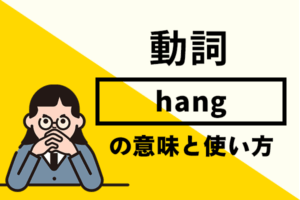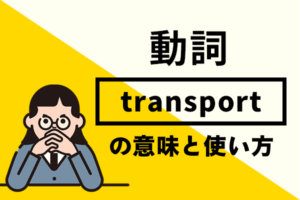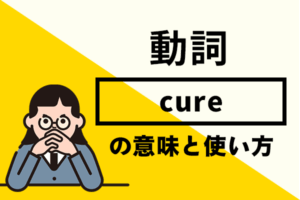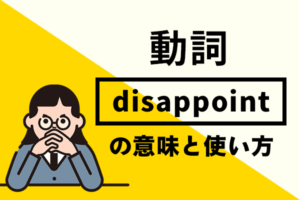「observe」という単語を見て、「見る」という意味だと思っていませんか?
実はobserveは単に「見る」だけではなく、「注意深く観察する」「守る」「述べる」など複数の重要な意味を持つ動詞です。
特にTOEICや英検、ビジネス英語では頻出の単語で、科学論文やフォーマルな文書でも多用されます。
この記事では、observeの正確な意味と使い方、watch・look・seeとの違い、実践的な例文まで詳しく解説します。
observeのコアイメージ
observeの語源はラテン語の「observare」(ob- = toward:~に向かって + servare = to watch:見守る)に由来します。
コアイメージは「目的を持って対象に注意を向け続ける」です。
単に目に入るだけの「see」や、動きを追う「watch」とは異なり、observeには「意図的に・注意深く・継続的に観察する」というニュアンスが含まれます。
科学者が実験を観察したり、探偵が容疑者を監視したりするイメージです。
また「規則や習慣を守る」という意味でも使われ、これは「注意を払い続ける→守り続ける」という意味の広がりから生まれました。
observeの基本情報
| 項目 | 内容 |
|---|---|
| 単語 | observe |
| 発音 | /əbˈzɜːrv/(アブザーヴ) |
| 品詞 | 動詞 |
| 語源 | ラテン語 observare(注意深く見る) |
| 派生語 | observation(名詞:観察)、observer(名詞:観察者)、observable(形容詞:観察可能な) |
| 活用形 | 形 |
|---|---|
| 原形 | observe |
| 三人称単数現在 | observes |
| 過去形 | observed |
| 過去分詞 | observed |
| 現在分詞 | observing |
※observeは動詞として使われるのが一般的ですが、派生語のobservationやobserverも頻繁に使われます。
発音・アクセントの注意
observeの発音は /əbˈzɜːrv/(アブザーヴ)で、第2音節の「zɜːr」にアクセントがあります。
日本語的に「オブザーブ」と読むと不自然になるため注意が必要です。
発音のポイント:
- 第1音節「ob」は弱く /əb/ と発音(「オブ」ではなく「アブ」)
- 第2音節「serve」を強く /ˈzɜːrv/ と発音(「ザーヴ」)
- 「s」は「z」の音になる(濁音)
- 語末の「e」は発音しない
派生語も確認しておきましょう:
- observation /ˌɑːbzərˈveɪʃn/(アブザヴェイション)- アクセントは第3音節
- observer /əbˈzɜːrvər/(アブザーヴァー)- アクセントは第2音節
- observable /əbˈzɜːrvəbl/(アブザーヴァブル)- アクセントは第2音節
observeの意味とニュアンス
注意深く観察する・見る
最も基本的な意味で、「目的を持って注意深く観察する」ことを表します。
科学的な観察、人や物の詳細な監視など、意図的で継続的な観察行為を指します。
Scientists observed the behavior of the animals for several months.
科学者たちは数ヶ月間、動物の行動を観察した。
I observed that she seemed nervous during the interview.
面接中、彼女が緊張しているように見えた(と観察した)。
The security cameras observe all activities in the building.
監視カメラは建物内のすべての活動を監視している。
規則・習慣・儀式などを守る
法律、規則、習慣、宗教的儀式などを「遵守する・守る」という意味です。
フォーマルな文脈で使われ、「follow」や「obey」よりも格式高い表現です。
All employees must observe the company’s safety regulations.
全従業員は会社の安全規則を遵守しなければならない。
Many people observe religious holidays.
多くの人々が宗教的な祝日を守っている。
Please observe silence in the library.
図書館では静粛を守ってください。
意見を述べる・論評する
フォーマルな文脈で「意見を述べる」「所見を述べる」という意味で使われます。
「say」や「comment」よりも知的で分析的なニュアンスがあります。
“The economy is showing signs of recovery,” the expert observed.
「経済は回復の兆しを見せている」と専門家は述べた。
She observed that the plan needed some modifications.
彼女は、その計画にはいくつか修正が必要だと述べた。
As the professor observed, the results were quite unexpected.
教授が述べたように、その結果は全く予想外だった。
observeの使い方
observe + 目的語(〜を観察する)
最も基本的な文型で、観察の対象を目的語として置きます。
この文型では「何を観察するか」が明確になります。
Astronomers observe distant galaxies through powerful telescopes.
天文学者は強力な望遠鏡を通して遠くの銀河を観察する。
The teacher observed the students’ progress throughout the semester.
教師は学期を通して生徒たちの進歩を観察した。
We need to observe market trends carefully before making decisions.
決定を下す前に、市場動向を注意深く観察する必要がある。
observe + 目的語 + 動詞の原形 / doing(〜が…するのを観察する)
知覚動詞としてのobserveの用法で、「目的語が何かをしているのを観察する」という意味です。
動詞の原形を使うと「動作全体」を、doingを使うと「進行中の動作」を強調します。
I observed him enter the building at 9 PM.
私は彼が午後9時に建物に入るのを観察した。(動作全体)
They observed the birds flying south for the winter.
彼らは冬に向けて南へ飛ぶ鳥たちを観察した。(進行中)
Scientists observed the chemical reaction take place under controlled conditions.
科学者たちは管理された条件下で化学反応が起こるのを観察した。
She observed the children playing in the park.
彼女は公園で遊ぶ子どもたちを観察した。
observe + that節(〜ということに気づく・述べる)
観察や分析の結果として「〜ということに気づく」「〜だと述べる」という意味で使います。
知的な分析や論評を伴う表現です。
Researchers observed that the new treatment was more effective.
研究者たちは、新しい治療法がより効果的だと気づいた。
He observed that there were several problems with the proposal.
彼は、その提案にはいくつか問題があると述べた。
We observed that customer satisfaction had increased significantly.
顧客満足度が著しく向上したことが分かった。
observeの句動詞
observeは基本的に句動詞を形成しませんが、前置詞と組み合わせた表現がいくつかあります。
observe closely
注意深く観察する
The detective observed the suspect closely for any suspicious behavior.
刑事は不審な行動がないか容疑者を注意深く観察した。
observe carefully
慎重に観察する
Students need to observe carefully how the experiment is conducted.
学生は実験がどのように行われるか慎重に観察する必要がある。
observe from a distance
遠くから観察する
Wildlife photographers often observe animals from a distance.
野生動物の写真家は、しばしば遠くから動物を観察する。
observeのコロケーション
| コロケーション | 意味 | 例文 |
|---|---|---|
| observe carefully | 注意深く観察する | Observe carefully before you proceed. |
| observe closely | 綿密に観察する | We observed closely how she solved the problem. |
| observe strictly | 厳格に守る | Safety rules must be observed strictly. |
| observe the rules | 規則を守る | All members must observe the rules. |
| observe silence | 静粛を守る | Please observe silence during the ceremony. |
| observe a tradition | 伝統を守る | They observe the tradition of family gatherings. |
| observe a holiday | 祝日を祝う | Many countries observe Independence Day. |
| closely observe | 綿密に観察する | Scientists closely observe climate changes. |
| directly observe | 直接観察する | It’s difficult to directly observe subatomic particles. |
| observe behavior | 行動を観察する | Psychologists observe behavior patterns. |
observeを使った例文(シーン別)
試験でよく出る例文
Scientists have observed that the temperature is rising.
科学者たちは気温が上昇していることを観察している。
All visitors are required to observe the museum’s regulations.
すべての来館者は美術館の規則を守ることが求められている。
The researcher observed the experiment being conducted.
研究者は実験が行われているのを観察した。
We observed him leave the office early yesterday.
私たちは昨日、彼がオフィスを早く出るのを目撃した。
It has been observed that students perform better with regular breaks.
定期的な休憩を取ると学生の成績が向上することが観察されている。
日常会話で使う例文
I observed that you’ve been working really hard lately.
最近、あなたが本当に一生懸命働いていることに気づいたよ。
Did you observe anything unusual this morning?
今朝、何か変わったことに気づいた?
Let me observe how you do it first.
まず、あなたがどうやるか見せてもらえる?
She observed that the store was closed on Mondays.
彼女はその店が月曜日に閉まっていることに気づいた。
We should observe the speed limit in this area.
このエリアでは制限速度を守るべきだね。
ビジネス文書・メールで使う例文
We have observed a significant increase in customer inquiries.
顧客からの問い合わせが大幅に増加していることが確認されました。
All employees must observe the confidentiality agreement.
全従業員は機密保持契約を遵守しなければなりません。
The management observed that productivity has improved this quarter.
経営陣は今四半期に生産性が向上したことを確認しました。
Please observe proper email etiquette when communicating with clients.
クライアントとやり取りする際は、適切なメールマナーを守ってください。
Our analysts have observed emerging trends in the market.
当社のアナリストは市場の新たなトレンドを観察しています。
It is essential to observe the deadline for this project.
このプロジェクトの期限を守ることが不可欠です。
observeの類義語・関連語
| 単語 | 品詞 | ニュアンス・解説 |
|---|---|---|
| watch | 動詞 | 動きのあるものを見る・注意を払う(カジュアル) |
| look | 動詞 | 意識的に視線を向ける(自動詞・look at) |
| see | 動詞 | 視界に入る・見える(意図的でない) |
| notice | 動詞 | 気づく・認識する |
| monitor | 動詞 | 継続的に監視する・モニターする |
| examine | 動詞 | 詳しく調べる・検査する |
| comply | 動詞 | (規則などに)従う・遵守する |
| follow | 動詞 | (規則などを)守る・従う(一般的) |
| obey | 動詞 | (命令・規則に)従う・服従する |
| remark | 動詞 | 述べる・意見を言う |
| note | 動詞 | 気づく・注目する・述べる |
「observe」と似た意味を持つwatchの意味と使い方や、視覚を表すseeの意味と使い方も合わせてチェックすると理解が深まります。
混同されやすい語との違い
observe vs watch
この2つは「見る」という意味で混同されやすいですが、重要な違いがあります。
observe:意図的で分析的な観察。科学的、学術的、専門的な文脈で使われることが多い。フォーマル。
watch:動きのあるものを追って見る。日常的な「見守る」「注意を払う」。カジュアル。
Scientists observed the chemical reaction carefully.
科学者たちは化学反応を注意深く観察した。(分析的・学術的)
I watched the chemical reaction take place.
化学反応が起こるのを見た。(視覚的に追った)
Doctors observe patients for signs of improvement.
医師は患者の改善の兆候を観察する。(専門的・継続的)
The nurse watched the patient throughout the night.
看護師は一晩中患者を見守った。(注意を払って)
使い分けのポイント:
- 科学的・学術的な観察 → observe
- 動きのあるものを追う → watch
- フォーマルな文書 → observe
- 日常会話 → watch
observe vs look / see
「見る」を表す基本動詞との違いを理解することが重要です。
observe:目的を持って注意深く観察する(意図的・分析的・継続的)
look:意識的に視線を向ける(意図的だが一時的)
see:視界に入る・見える(意図的でない・自然に)
The detective observed the suspect’s movements for hours.
刑事は容疑者の動きを何時間も観察した。(継続的・分析的)
Look at that beautiful sunset!
あの美しい夕日を見て!(視線を向ける)
I saw him at the station this morning.
今朝、駅で彼を見かけた。(偶然視界に入った)
Researchers observe animal behavior in their natural habitat.
研究者は動物の行動を自然環境で観察する。(学術的)
Let me look at your report.
あなたのレポートを見せて。(一時的に目を通す)
Did you see the news today?
今日のニュース見た?(視聴した)
違いのまとめ
| 動詞 | 意図性 | 継続性 | 分析性 | フォーマル度 |
|---|---|---|---|---|
| observe | ◎ | ◎ | ◎ | 高 |
| watch | ◎ | ○ | △ | 中 |
| look | ◎ | △ | △ | 中 |
| see | × | △ | × | 中 |
試験・ビジネス頻出度
TOEIC
頻出度:★★★★☆(頻出)
Part 5(文法問題)とPart 7(読解問題)で頻出します。特に「observe + that節」の形式や、「observe the rules/regulations」などのコロケーションが出題されます。
ビジネスシーンでの「規則を守る」という意味での出題が多いです。
TOEICでの出題パターン:
- All employees must ______ the safety regulations.(observe)
- We have ______ a decline in sales this quarter.(observed)
- The manager ______ that the project was behind schedule.(observed)
英検
頻出度:★★★★☆(頻出)
準1級以上で頻出。科学的な文章や論説文での「観察する」という意味や、「規則を守る」という意味で登場します。
2次試験のスピーチやエッセイでも使える重要語です。
ビジネス英語
頻出度:★★★★★(最頻出)
ビジネス文書、メール、プレゼンテーションで非常によく使われます。
「市場動向を観察する」「規則を遵守する」「傾向を述べる」など、多様な場面で活躍します。
学術英語
頻出度:★★★★★(最頻出)
科学論文、研究報告書では必須の動詞です。
「observe that…」の形で研究結果や所見を述べる際に頻繁に使用されます。
ネイティブがよく使う自然な表現
フォーマル・ビジネスシーン(観察・見守る)
We’ve been observing the market trends closely over the past few months.
→ ここ数か月、市場動向を注意深く観察しています。
The manager observed how the team handled the new project.
→ マネージャーはチームが新プロジェクトをどう進めるか観察していた。
Let’s observe the customer’s behavior before making changes.
→ 変更を加える前に顧客の行動を観察しましょう。
During the presentation, she observed that everyone seemed engaged.
→ プレゼン中、彼女は皆が集中していることに気づいた。
We need to observe the results over a longer period.
→ 長期的に結果を観察する必要があります。
日常会話(気づく・感じ取る)
I observed that you’ve been quieter than usual lately.
→ 最近、いつもより静かだなって気づいたよ。
Did you observe how she looked at him?
→ 彼女が彼を見たときの目つき、気づいた?
I just observed something interesting about this show.
→ この番組についてちょっと面白いことに気づいたんだ。
He didn’t say anything, but I observed a change in his tone.
→ 何も言わなかったけど、声のトーンが変わったのに気づいた。
If you observe carefully, you’ll see the difference.
→ よく観察すれば違いがわかるよ。
科学・研究・教育シーン(実験・調査)
The scientists observed a significant reaction in the experiment.
→ 科学者たちは実験で顕著な反応を観察した。
We observed the animals in their natural habitat.
→ 私たちは動物たちを自然の生息地で観察した。
Students were asked to observe the chemical process closely.
→ 学生たちは化学反応を注意深く観察するよう求められた。
Researchers observed an increase in temperature during the test.
→ 研究者たちはテスト中に温度の上昇を観察した。
The data was observed over a period of six months.
→ データは6か月間にわたって観察された。
observeのよくある間違い
他動詞なのに「at」をつけてしまう
❌ I observed at the birds in the garden.
✅ I observed the birds in the garden.
解説:observeは他動詞なので前置詞は不要です。「look at」と混同しないようにしましょう。
知覚動詞の後に「to不定詞」を使う
❌ We observed him to leave the room.
✅ We observed him leave the room.
解説:知覚動詞のobserveの後は「to不定詞」ではなく「動詞の原形」または「doing」を使います。
他動詞なのに「on」をつけてしまう
❌ Scientists are observing on the climate changes.
✅ Scientists are observing the climate changes.
解説:observeは他動詞なので「on」は不要です。
「to」をつけてしまう
❌ Please observe to the rules.
✅ Please observe the rules.
解説:「規則を守る」という意味のobserveも他動詞です。前置詞「to」は不要。
that節内の文法ミス
❌ I observed that he was came late.
✅ I observed that he came late.
解説:that節の中では通常の文法に従います。「was came」は誤り。
受動態と能動態の使い分け
❌ The tradition is observed by many people.
✅ The tradition is observed by many people.
(これは正しいですが、能動態も確認)
✅ Many people observe the tradition.
解説:「伝統を守る」という意味では能動態が自然です。受動態も文法的には正しいですが、能動態の方が一般的。
「observe + 人 + that節」とする
❌ He observed me that I should be careful.
✅ He observed that I should be careful.
解説:「observe + 人 + that節」という形は取りません。直接「observe + that節」です。
observeの理解度チェック
穴埋め問題(5問)
1. Scientists ______ the behavior of dolphins for six months.
(科学者たちは6ヶ月間、イルカの行動を観察した)
2. All visitors must ______ the museum’s photography policy.
(すべての来館者は美術館の撮影方針を守らなければならない)
3. I ______ him ______ the building around midnight.
(私は彼が真夜中ごろに建物に入るのを目撃した)
4. The researcher ______ that the results were inconsistent with previous studies.
(研究者は、結果が以前の研究と矛盾していると述べた)
5. Please ______ silence during the examination.
(試験中は静粛を守ってください)
選択肢問題(5問)
1. We ______ a significant improvement in customer satisfaction scores.
a) observed
b) looked
c) saw at
d) watched to
2. All employees are required to strictly ______ the company’s code of conduct.
a) look
b) see
c) observe
d) watch
3. The scientist ______ the chemical reaction ______ under controlled conditions.
a) observed / to occur
b) observed / occur
c) observed / occurs
d) observed / occurred
4. It has been ______ that regular exercise improves mental health.
a) observed
b) looked
c) seen
d) watched
5. “The market is becoming increasingly competitive,” the analyst ______.
a) looked
b) saw
c) observed
d) watched
解答
穴埋め問題の解答:
1. observed
解説:「観察した」という意味で、過去形を使用。
2. observe
解説:「must」の後なので原形。「規則を守る」という意味。
3. observed / enter(または entering)
解説:知覚動詞の用法。「目的語 + 動詞の原形」または「目的語 + doing」の形。
4. observed
解説:「述べた」という意味で、過去形を使用。
5. observe
解説:命令文なので原形。「静粛を守る」という意味。
選択肢問題の解答:
1. a) observed
解説:ビジネス文脈での「観察した・確認した」という意味。lookやseeは不適切。
2. c) observe
解説:「規則を遵守する」という意味での使用。この意味で使えるのはobserveのみ。
3. b) observed / occur
解説:知覚動詞observeの後は動詞の原形(occur)を使用。to不定詞は不可。
4. a) observed
解説:「It has been observed that…」は「〜ということが観察されている」という定型表現。
5. c) observed
解説:専門家が意見を述べる際の「observed」の用法。フォーマルな表現。
observeのコーパス実例
新聞記事:The New York Times
“Researchers observed that patients who received the new treatment showed remarkable improvement,” the study reported.
「研究者たちは、新しい治療を受けた患者が著しい改善を示したことを観察した」と研究は報告した。
解説:医学研究の文脈で、「observe + that節」の形で研究結果を述べています。科学論文や報道でよく見られる表現です。
Wildlife experts have been observing the migration patterns of these birds for decades.
野生動物の専門家たちは、これらの鳥の渡りのパターンを何十年も観察してきた。
解説:継続的な観察を表す現在完了進行形での使用。長期的な研究活動を示しています。
日常会話:映画のセリフ
“I’ve been observing you, and I think you have real talent.”
「あなたを観察してきたけど、本当に才能があると思うよ。」
解説:日常会話でも「観察する」という意味で使われますが、やや改まった印象を与えます。相手の能力や行動を注意深く見てきたことを伝えています。
“Did you observe anything unusual last night?”
「昨夜、何か変わったことに気づいた?」
解説:探偵や刑事ドラマでよく聞かれる表現。「notice」よりもフォーマルで、より意図的な観察を示唆します。
ビジネススピーチ:TED Talk
“Over the past year, we’ve observed a dramatic shift in consumer behavior.”
「過去1年間で、私たちは消費者行動の劇的な変化を観察してきました。」
解説:ビジネスプレゼンテーションでの典型的な使用例。データや市場動向を分析した結果を述べる際の表現です。
“As we observe the changing landscape of technology, we must adapt our strategies accordingly.”
「技術の変化する状況を観察するにつれて、それに応じて戦略を適応させなければなりません。」
解説:「observe」を使うことで、単に見ているだけでなく、分析的に状況を把握していることを示しています。ビジネスリーダーらしい表現です。
observeに関するよくある質問
まとめ
- observeのコアイメージは「目的を持って対象に注意を向け続ける」
- 主な意味は「注意深く観察する」「規則を守る」「意見を述べる」の3つ
- watchは「動きを追う」、lookは「視線を向ける」、seeは「視界に入る」と区別する
- 知覚動詞として「observe + 目的語 + 動詞の原形/doing」の形を取る
- 「observe + that節」で「〜ということに気づく・述べる」を表す
- TOEICやビジネス英語で頻出、特に「規則を守る」の意味が重要
- 他動詞なので前置詞(at、onなど)は不要
この記事の例文や練習問題を繰り返し復習すると、observeの使い方が自然に身につきます。
英単語を効率よく覚えられるおすすめ本
英語学習の基本は、まず語彙力をしっかり身につけること。
ここでは、効率よく英単語を覚えて、長く使える力に変えていけるおすすめの本をご紹介します。

